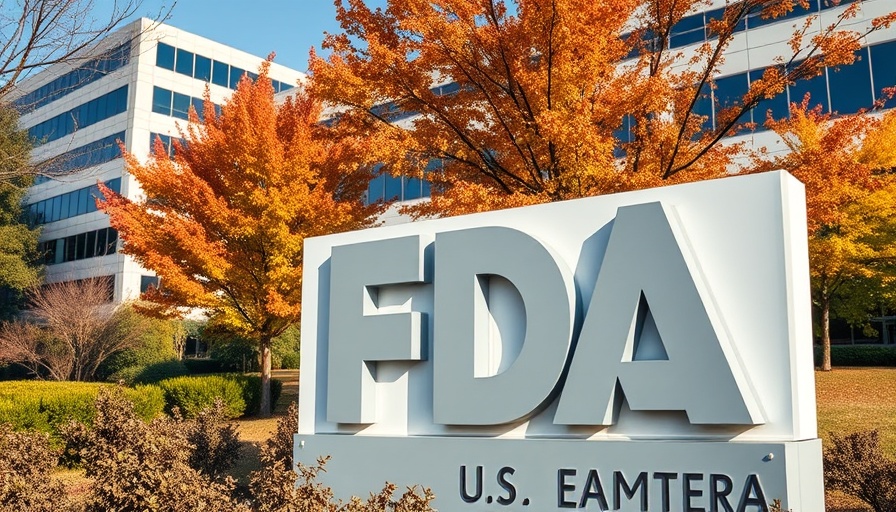
FDA's Pivotal June Deadline: What It Means for the Pharma Landscape
On May 9, 2025, FDA chief Martin Makary announced an ambitious deadline for the rollout of generative AI (genAI) within the pharmaceutical sector, setting the stage for what could be a significant transformational shift across the industry. As pharmaceutical sales representatives, executives, and marketers prepare for its implementation, understanding the implications and opportunities may be critical to maintaining a competitive edge in this rapidly evolving environment.
Understanding Generative AI and Its Applications in Pharma
Generative AI encompasses various technologies designed to automate and optimize processes by interpreting large datasets to generate new content, whether it be product formulations, marketing strategies, or even drug discovery processes. The rapid progress in AI has triggered robust discussions surrounding data privacy, ethical considerations, and compliance with FDA regulations, intertwining technological advancement with regulatory scrutiny.
Its applications could range from enhancing clinical trial recruitment strategies through predictive analytics to formulating personalized treatment options tailored to specific patient demographics. Implementing genAI is not merely a trend; it represents a paradigm shift in how pharma engages with healthcare providers and patients alike.
Market Reactions: Awareness and Adaptation Strategies
As the industry gears up for genAI deployment, immediate concerns have surfaced about workforce readiness and market acceptance. Pharmaceutical sales teams must harness contemporary insights and adapt their marketing strategies to remain relevant.
Pharma sales reps who leverage AI tactics can enhance customer interactions by anticipating needs based on previous interactions and health trends, thus fostering loyalty in an increasingly competitive prescription drug market.
To assist in this transition, proactive pharma marketing strategies that focus on educating customers about AI benefits could lead to smoother market integration. Incorporating patient engagement initiatives, for example, may illustrate the human-centric relevance of this technology, making it more palatable for stakeholders.
Impact on Drug Launch Announcements
The introduction of generative AI could revolutionize how pharmaceutical companies strategize drug launches. By utilizing data-driven insights from past launches, companies can forecast market responses and optimize their approaches accordingly. This data could facilitate informed formulary decisions that effectively position new drugs within the market.
Moreover, generative AI tools can refine messaging and branding strategies, adapting them in real-time based on feedback from healthcare providers and patients as they navigate the drug launch landscape. Crafting compelling narratives around products while highlighting unique benefits and value will be pivotal as the industry evolves.
Future Predictions and Opportunities in the Biotech Landscape
With the FDA's new deadline, we are entering a phase where biotech firms will face pressure to innovate exceedingly fast. Those that embrace generative AI are likely to lead the charge in redefining business models.
Opportunities in biotech ventures may expand, with startups potentially emerging as key players today by harnessing these technologies. However, as the landscape evolves, tightly-knit collaborations between established pharma companies and biotech firms may lead to cutting-edge developments, capitalizing on shared resources and expertise.
Preparing for Change: Educating and Equipping the Workforce
The need for comprehensive education regarding AI tools and techniques cannot be overstated. Pharma companies must invest not only in technology but also in training their workforce to adapt and excel in this new environment.
Insightful resources, including clinical education platforms focused on AI applications, will be crucial during this transitional phase. Furthermore, ongoing education opportunities can empower sales reps and marketing teams, equipping them with actionable insights to leverage AI effectively.
Concluding Thoughts: Embrace the Evolution
As the generative AI rollout approaches, the pharmaceutical industry stands at the brink of transformation. The implications of this technology, from enhanced operational efficiencies to innovative product offerings, are vast. Embracing this evolution fully could mean the difference between thriving and merely surviving in an increasingly competitive market.
The time has come for pharmaceutical stakeholders to engage in discussions about AI's future within their organizations actively. By preparing for the impending changes, they not only position themselves as market leaders but also ensure that they can continue to address the complex healthcare needs of their patients.
 Add Row
Add Row  Add
Add 




Write A Comment